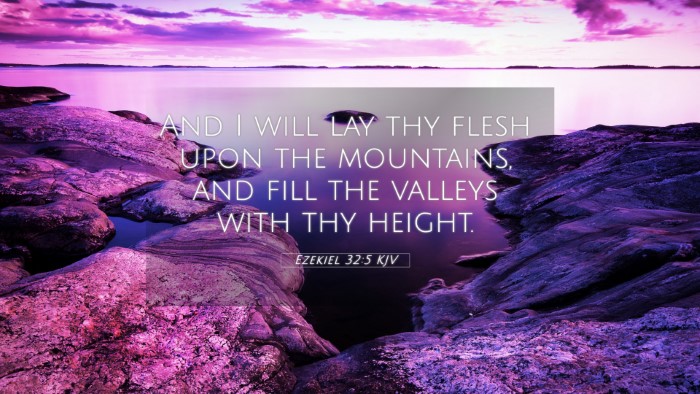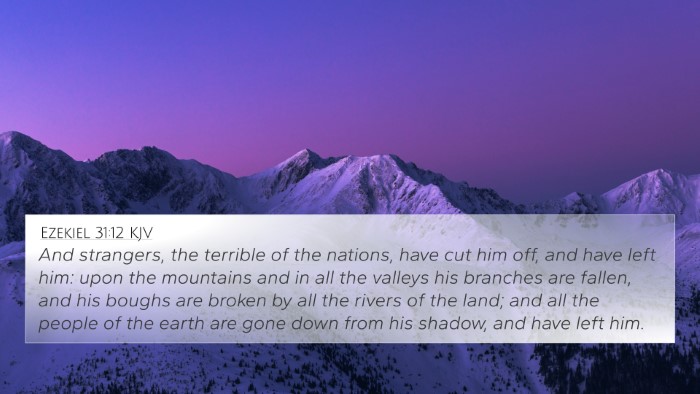Ezekiel 32:5 - Summary and Interpretation
Ezekiel 32:5 states:
"I will lay thy flesh upon the mountains, and fill the valleys with thy height."
This verse is a profound declaration by God through the prophet Ezekiel, pointing to the fate of Pharaoh and Egypt, symbolizing their ultimate downfall and desolation.
Meaning and Insights
The interpretation of Ezekiel 32:5 involves multiple layers of meaning, particularly focusing on themes of judgment, accountability, and the consequences of defiance against God. Combining the insights from public domain commentaries, we can unwrap the depth of this verse.
Overview of Interpretations
- Matthew Henry: Henry emphasizes the metaphorical images used by Ezekiel, highlighting the great fall of Egypt as a result of its pride and idolatry. The imagery of flesh upon mountains suggests an overwhelming defeat visible to all.
- Albert Barnes: Barnes notes the prophetic nature of this verse, indicating that God would make a public spectacle of Pharaoh's downfall. The mountains represent the heights from which Egypt's power will fall, and the valleys symbolize its utter ruins.
- Adam Clarke: Clarke elaborates on the symbolic significance of the geographical imagery, inferring that the widespread nature of God's judgment would lead to Egypt's recognition as a warning to others who oppose divine will.
Thematic Connections and Cross-References
This verse connects with several other Scriptures that highlight the themes of divine judgment and the consequences faced by nations or individuals that turn away from God. Below are some pertinent cross-references:
- Isaiah 14:15: "Yet thou shalt be brought down to hell, to the sides of the pit." - This correlates with the humiliation of Pharaoh.
- Jeremiah 46:11-12: Discusses the destruction of Egypt, resonating with the themes in Ezekiel.
- Revelation 19:20: Alludes to the final downfall of a nation opposing God.
- Psalms 79:10: Reflects God's concern over the derision faced by His people.
- Ezekiel 30:6: Also addresses the consequences awaiting Egypt, emphasizing the cohesion of Ezekiel's prophetic voice.
- Deuteronomy 28:49-52: A reminder of God's warnings regarding the consequences of disobedience.
- Exodus 15:7: Demonstrates God’s power over the nations.
Practical Application and Reflection
Understanding Ezekiel 32:5 invites believers to reflect on the magnitude of God’s judgment and His sovereignty over all nations. It serves as a warning against pride and rebellion. The imagery involved provides a stark reminder of the temporality of worldly power compared to the everlasting dominion of God.
Cross-Referencing and Tools for Biblical Study
For deeper exploration of similar themes, consider using the following tools:
- Bible Concordance: A helpful tool to find verses that relate to specific themes or words.
- Bible Cross-Reference Guide: Essential for exploring how different scripture passages correlate with Ezekiel 32:5.
- Cross-reference Bible study methods: Techniques that help analyze scripture through a comparative lens.
- Comprehensive Bible cross-reference materials: Resources that compile various passages related thematically or contextually.
Further Study Recommendations
To delve deeper into the context of Ezekiel's prophecies and their implications, examine other verses and themes, such as:
- Identifying connections between Old and New Testament - Explore how themes of judgment manifest throughout scripture.
- Cross-referencing Psalms with New Testament teachings - Understand how poetic reflections echo prophetic declarations.
Conclusion
In summary, Ezekiel 32:5 invites believers into a deeper understanding of divine justice, the fragility of human power, and the importance of aligning with God's will. By utilizing cross-referencing tools and studying the connections between related scriptures, one can gain a more comprehensive view of biblical themes that address human pride and the assurance of God's ultimate authority.



